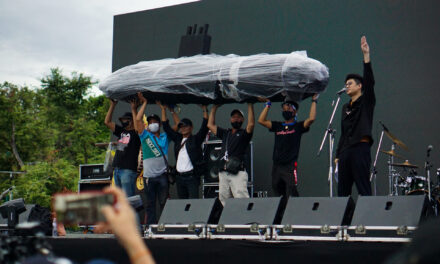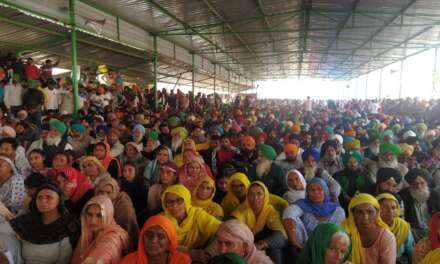by Joseph Purugganan
A year before the pandemic, the Asian Movement for Peoples’ Peace and Progress or AMP3, a collective of artists with a network of socially engaged musicians across Asia, organized a week-long songwriting workshop in Bangkok, Thailand. The idea was to write and produce new songs through a process of co-creation of new songs and cross-translation of existing material.
“Sama-sama: Asian Co-Creative Gathering” brought together singer-songwriters associated with AMP3 from Cambodia, Indonesia, the Philippines, Timor Leste, and Thailand to produce songs about social, political, cultural, and other issues they and their communities face.
Buoyed by the release of the album A Village in the Making: Peoples’ Music from Southeast Asia, a collection of original songs composed and recorded by the AMP3 members, the plan was to quickly follow that up with a second album of songs from the Sama-Sama workshop.
Like everything else, those plans changed with the pandemic. The first response was to regroup and check in on how the members were doing. Zoom calls were organized for members to share updates on the health situation, and how communities that we belong to or engage with closely are doing, across our respective countries. We also discussed how governments across the region are responding to the crisis, with serious concerns raised against militarized and heavy-handed responses, particularly in the implementation of lockdowns. The particular situation of full-time, working musicians and so called gig economy workers also became a topic of discussion.
Sama-Sama Music: Beyond Borders
These discussions eventually turned into brainstorming sessions that led to the conceptualization of Sama-Sama: Music Beyond Borders, a series of online performances aimed at building regional solidarity through music in the time of Covid crisis.
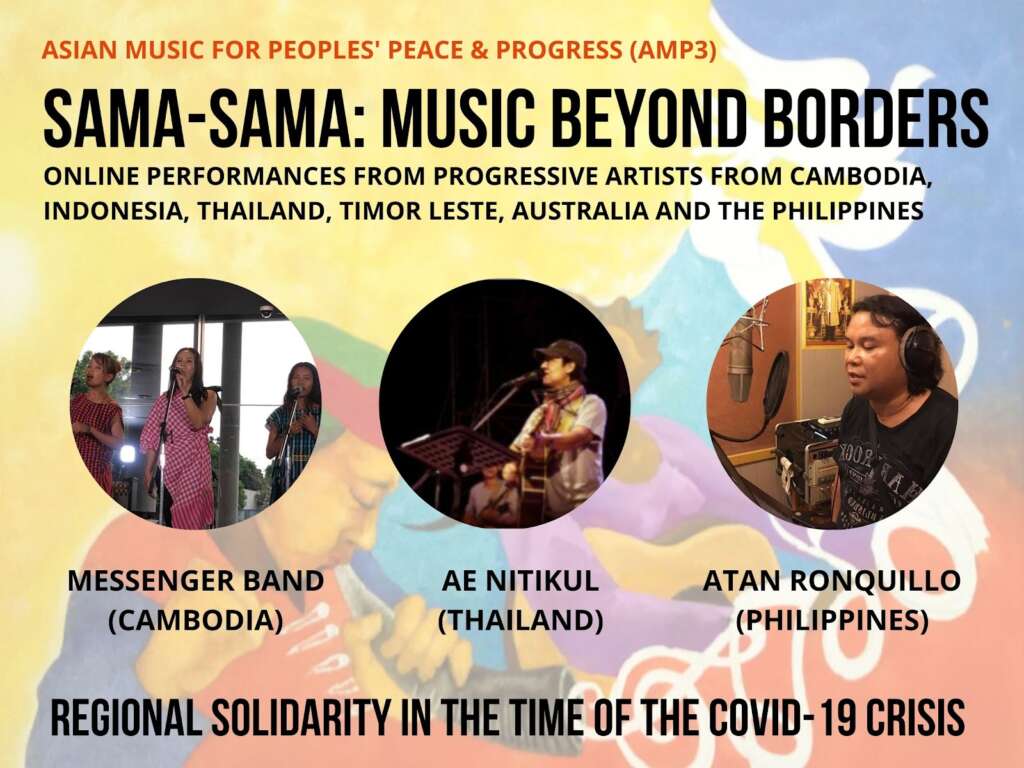
A total of 14 online performances were conducted from March- April 2020 with performances from Cambodia, Indonesia, Philippines, Thailand, Timor Leste, Japan, and Filipino migrant groups in Canada.
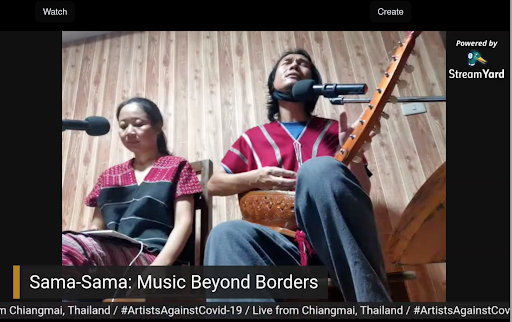
Kumustahan at Diskurso
Aside from performances, AMP3 added another element to its online response- cross-cultural sharing of experiences and exchange of views and perspectives among artists and activists on key issues faced by communities during the time of the pandemic and the lockdowns.
The online spaces allowed artists to report on the situation in their respective communities as well as how they themselves are coping with the crisis. They shared about anxieties that cultural workers are feeling over an uncertain future, but also how their music and art have provided an outlet for them to cope and help others to overcome the crisis.
There was a discussion on the impact of the pandemic on indigenous communities, with Karen musician and AMP3 member Dr. Suwichan Phatthanaphraiwan (Chi) from Thailand, and Judy Pasimio, Coordinator of Lilak, Purple Action for Indigenous Women’s Rights in the Philippines.
Another discussion among Bali-based artists highlighted local efforts of artists to raise funds to buy protective equipment for health workers through concerts and cultural performances of local artists, all posted online as well.
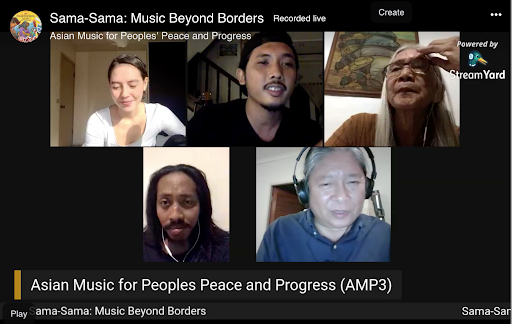
Community Outreach projects
AMP3 members also initiated local community outreach projects during the pandemic. One such project was the Rice for Fish, Fish for Rice Project initiative. Chi Suwichan and Jenny Kueuwa from the Karen indigenous community, pioneered the idea of “cultural economy” in their food-exchange project that aimed to build cross-sectoral solidarity and mutual aid between indigenous farmers and sea people in Thailand. As explained by Chi, “Karen people provide their rice in exchange for fish caught by sea people. The program is a mutual help and solidarity project during the Covid-19 period. The sea people are struggling to make ends meet and secure their own food, as they cannot sell their fish because of the lockdown imposed by the government.” Chi added that the project was designed “so that the dried fish can be exchanged with Karen rice in the mountain because Karen people have also been preoccupied with the effort to stop the wildfires that have devastated our areas (prior to Covid). So we also need dry food to eat in the forest during this crisis.”
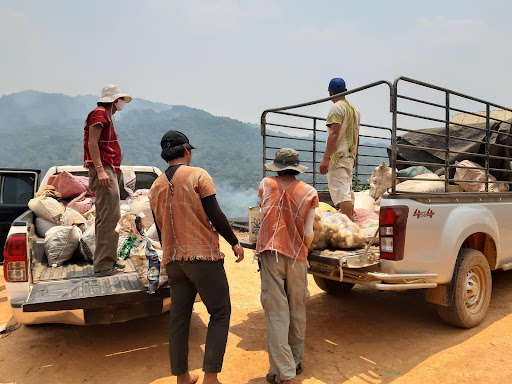
Another project initiated by Thai musicians, Nitithorn Thongthirakul (Ae) and Pakapol Kornkranok (Pik) from Bangkok, Thailand, provided children, especially in the rural areas, access to music instruments, to help them cope with the restrictions of the pandemic, as well as giving them skills to pursue a career in music.
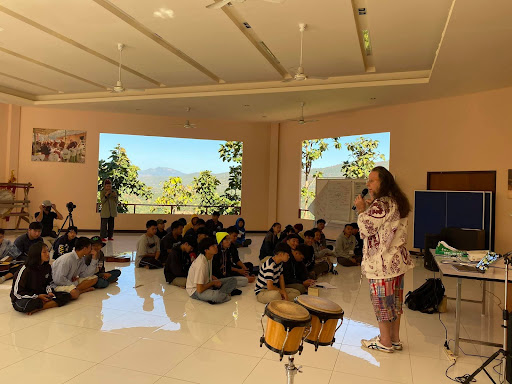
The Messenger Band from Cambodia, who work with garment factory workers, sex workers, farmers and cultural workers, continued to use their music to give voice to community aspirations and raise awareness of social issues. Among the countries in Southeast Asia, Cambodia had a relatively smaller number of cases in the early part of 2020, which meant fewer restrictions. This allowed the band to continue their grassroots community work facilitating community-level discussions on issues, and joining efforts to document impact. The band channeled these interactions with the community to the writing and production of new songs, that touch on themes related to the Covid-19 induced health and economic crisis.
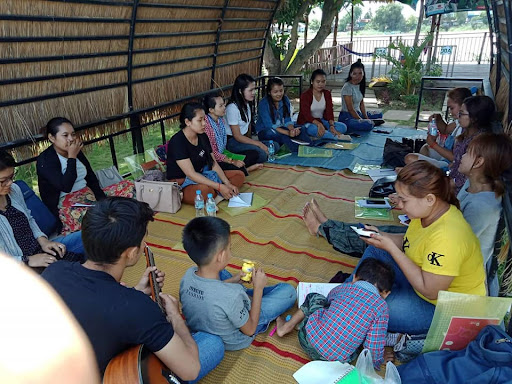
In the Philippines, the bands Village Idiots and Musikang Bayan spearheaded and supported efforts like Kayakap: Fundraising Campaign for Working Musicians, and Lilak’s Babayanihan: Women’s Solidarity for indigenous communities to raise funds in support of fellow artists, as well as communities in dire need of economic relief.
Songs as chronicles
Musicians channeled their creative energies into new compositions dealing with themes related to the pandemic and the economic crisis. The plight of medical frontliners became a central theme that inspired the creation of new songs from the Messenger Band in Cambodia, Village Idiots, and Danny Fabella in the Philippines. Songs of resistance and defiance also emerged in reaction to militarized responses in the Philippines. Danny Fabella’s composition Unseen Enemy for example lamented the lost of lives and the failed State response:
We continue to lose precious lives everyday
But the people in power, who are supposed to care, don’t dare
So it’s up to us to come together
With kindness and reason, understanding and love to share
– Solidarity and Resistance
New songs about resistance also emerged during the crisis as communities challenged increasing authoritarianism and militarization across the region. Nitithorn” Ae” Thongthirakul’s song “The Birds haven’t stopped calling”, based on a poem by Thai activist Wisa Kanthup, was shared in various online solidarity events for activists in Myanmar.
AMP3 members (Bong Ramilo, and the Village Idiots) also helped set up Resistors Radio, a social media platform to share songs of resistance from and outside the Philippines. Resistors Radio organized live chats as well with musicians to discuss their songs, and how their music and art contribute to advancing local and international struggles. One episode of Resistors Radio Chat featured a discussion with Myanmar journalist Mon Mon Myat, on the role of music in the new wave of protests that erupted across Myanmar in opposition to the military coup.
AMP3 also expressed its solidarity to musicians experiencing repression across the region. In August 2021, AMP3 issued two solidarity statements in support of musicians and their communities. In early August, AMP3 expressed solidarity to Hong Kong based musician Anthony Wong who was arrested over trumped up corruption charges. AMP3 asserted that “the democratic exercise by musicians, poets, and other cultural workers to use culture to enlighten and educate is a right guaranteed under international human rights law.”
On the occasion of International Day of World’s Indigenous Peoples’, AMP3 issued a statement supporting the struggle of the Karen community in Kaeng Krachan in Thailand fighting efforts to drive them out of their ancestral lands.
As AMP founder Jess Santiago remarked: “As we all know the pandemic has caused a lot of fear and anxiety among people. I believe that musicians in particular can help give expression to these fears and anxiety of people through songs.” Santiago also pointed out how songs are being used to promote the necessary health protocols like proper washing hands, proper physical distancing, helping to effectively convey these messages through public service announcements.
Conclusion
AMP3’s response to the Covid 19 pandemic, started with the idea of music as an expression of regional solidarity. In our experience, we saw that music can provide relief to help ease the feelings of anxiety that many of us were facing in the wake of the unprecedented global crisis.
The pandemic and the lockdowns posed huge challenges to musicians. For full time musicians relying on regular gigs/concerts as a source of income, the indefinite closure of venues and the absence of concerts was a major problem and source of anxiety. But artists across the region were also motivated by the crisis to do their part in helping others cope and overcome the many challenges.
Producing home recordings and sharing these through online platforms became key strategies facilitating the artists response, and working closely with communities, other like minded groups, and organizations, collaborative projects that responded to concrete needs emerged and were implemented across the region.
The new songs that came out and will continue to come out in the context of the pandemic, represent important historical documentation, not just of the peoples’ shared and collective experiences in dealing with the pandemic– the fear, anxiety, but also the aspiration that more inclusive, kinder, and just societies could be built in the aftermath of the crisis.
—
*This article is included in the regional report Southeast Asian Peoples in Pandemic Times: Challenges and Responses (Covid-19 Grassroots Report Volume 2) published by the University of the Philippines Center for Integrative and Development Studies (UP-CIDS) Program in Alternative Development with support from 11.11.11 Coalition of the Flemish North-South Movement. The full report can be downloaded here: https://tinyurl.com/



